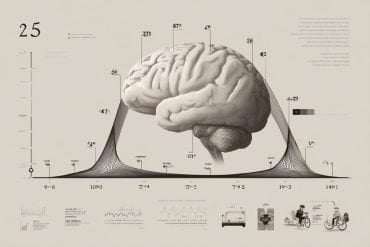Summary: Researchers have provided evidence linking maternal undernutrition, specifically low fiber intake during pregnancy, to neurodevelopmental delays in children. They compared the developmental progress of children born to mothers with varying fiber intake levels during pregnancy.
Findings indicated that offspring of mothers who consumed less fiber were more likely to experience delays in various brain functions including communication, problem-solving, and personal-social skills.
This large-scale study reinforces the importance of balanced nutrition for expecting mothers and the potential long-term impacts on child development.
Key Facts:
- Mothers with low dietary fiber intake during pregnancy may increase the risk of neurodevelopmental delays in their children, affecting functions like communication, problem-solving, and motor skills.
- The study, based on over 76,000 mother-infant pairs in Japan, found that only 8.4% of Japanese pregnant women consumed the recommended amount of fiber.
- Despite adjusting for folic acid intake, the study couldn’t rule out the impact of other nutrients on the findings, and didn’t account for fiber intake from supplements.
Source: Frontiers
Undernutrition during pregnancy is one of the factors linked to an increased risk of diseases in children as they grow older. Yet, maternal malnutrition remains a problem for women worldwide.
Animal studies have shown that a low-fiber diet during pregnancy impairs brain nerve function in offspring.

Now, in the first human cohort study on the relation of maternal nutritional imbalance and infants’ brain development, researchers in Japan have investigated if the same effects can be found in humans.
“Most pregnant women in Japan consume far less dietary fiber than what is the recommended intake,” said Dr Kunio Miyake, a researcher at the University of Yamanashi and first author of the study published in Frontiers in Nutrition.
“Our results provided reinforcing evidence that undernutrition during pregnancy is associated with an increased risk of neurodevelopmental delay in children.”
Fiber for brain development
Miyake et al. compared the development of children whose mothers had the highest intake of dietary fiber to groups of mothers who consumed successively less fiber during pregnancy.
In comparison to the highest-intake group, the children of mothers in the low-intake groups were more likely to show neurodevelopmental delays. The effect of maternal fiber undersupply was noticeable in several domains related to brain function.
Affected were communication skills, problem solving skills, and personal-social skills. The researchers also found delays in the development of large body part movement and coordination, as well as in the coordination of smaller muscles.
The researchers’ results are based on the analysis of more than 76,000 mother-infant pairs from the Japan Environment and Children’s Study. It is an ongoing project aiming to elucidate how the environment affects children’s health.
To collect dietary information about the participants, the scientists used a food frequency questionnaire, which asked respondents about their dietary status during the second and third trimester of pregnancy.
Developmental delays were assessed in another questionnaire that was sent to parents once their children were three years old. Based on parents’ answers, the researchers showed the correlation of maternal fiber intake and child brain development.
Nutritional guidance is crucial
The researchers also found that the median dietary fiber intake in Japan is just over 10 grams a day. Only 8.4% of Japanese pregnant women consumed enough fiber. They also pointed out that the recommended fiber intake for pregnant women varies: While in Japan the recommended daily dietary fiber intake is 18 grams each day, it is 28 grams in the US and Canada.
“Our results show that nutritional guidance for pregnant mothers is crucial to reduce the risk of future health problems for their children,” said Miyake.
The researchers also pointed to certain limitations of their study.
“Human studies cannot assess the effects of dietary fiber alone. Although this study considered the impact of folic acid intake during pregnancy, the possibility of other nutrients having an impact cannot be completely ruled out,” Miyake pointed out.
“In addition, dietary fiber intake from supplements could not be investigated.”
About this diet, pregnancy, and neurodevelopment research news
Author: Deborah Pirchner
Source: Frontiers
Contact: Deborah Pirchner – Frontiers
Image: The image is credited to Neuroscience News
Original Research: Open access.
“Maternal dietary fiber intake during pregnancy and child development: The Japan Environment and Children’s Study” by Kunio Miyake et al. Frontiers in Nutrition
Abstract
Maternal dietary fiber intake during pregnancy and child development: The Japan Environment and Children’s Study
Background: Animal studies have shown that maternal low-fiber diets during pregnancy may impair brain development and function in offspring, but this has not been validated by epidemiological studies. The aim of this study was to investigate the link between maternal dietary fiber intake during pregnancy and neurodevelopmental delay in offspring using a large birth cohort.
Methods: A total of 76,207 mother-infant pairs were analyzed using data from the Japan Environment and Children’s Study, a nationwide prospective cohort study. Maternal dietary fiber intake was estimated using the food frequency questionnaire in mid-pregnancy. Maternal dietary fiber intake was adjusted for energy and classified into quintiles. Developmental delay was assessed in five domains using the Japanese version of the Ages and Stages Questionnaire, Third Edition at the age of 3 years. The logistic regression analysis was performed to estimate the odds ratio (OR) and 95% confidence interval (CI) for the link between dietary fiber intake during pregnancy and developmental delay at the age of 3 years.
Results: The lowest intake group of total dietary fiber had a higher risk of delayed communication [adjusted OR (aOR), 1.51; 95% CI, 1.32–1.74], fine motor (aOR, 1.45; 95% CI, 1.32–1.61), problem-solving (aOR, 1.46; 95% CI, 1.32–1.61), and personal-social skills (aOR, 1.30; 95% CI, 1.12–1.50) than did the highest intake group. An analysis that excluded the effects of insufficient folic acid intake during pregnancy also showed a similar trend.
Conclusion: This study showed that maternal dietary fiber deficiency during pregnancy might influence an increased risk of neurodevelopmental delay in offspring.






